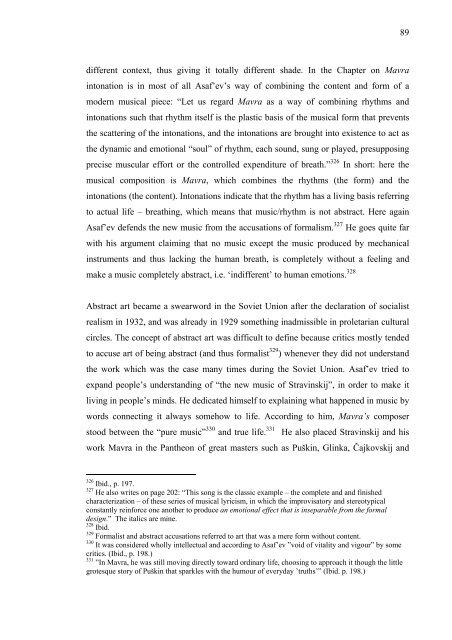Boris Asaf'ev and the Soviet Musicology - E-thesis
Boris Asaf'ev and the Soviet Musicology - E-thesis
Boris Asaf'ev and the Soviet Musicology - E-thesis
Create successful ePaper yourself
Turn your PDF publications into a flip-book with our unique Google optimized e-Paper software.
different context, thus giving it totally different shade. In <strong>the</strong> Chapter on Mavra<br />
intonation is in most of all Asaf’ev’s way of combining <strong>the</strong> content <strong>and</strong> form of a<br />
modern musical piece: “Let us regard Mavra as a way of combining rhythms <strong>and</strong><br />
intonations such that rhythm itself is <strong>the</strong> plastic basis of <strong>the</strong> musical form that prevents<br />
<strong>the</strong> scattering of <strong>the</strong> intonations, <strong>and</strong> <strong>the</strong> intonations are brought into existence to act as<br />
<strong>the</strong> dynamic <strong>and</strong> emotional “soul” of rhythm, each sound, sung or played, presupposing<br />
precise muscular effort or <strong>the</strong> controlled expenditure of breath.” 326 In short: here <strong>the</strong><br />
musical composition is Mavra, which combines <strong>the</strong> rhythms (<strong>the</strong> form) <strong>and</strong> <strong>the</strong><br />
intonations (<strong>the</strong> content). Intonations indicate that <strong>the</strong> rhythm has a living basis referring<br />
to actual life – breathing, which means that music/rhythm is not abstract. Here again<br />
Asaf’ev defends <strong>the</strong> new music from <strong>the</strong> accusations of formalism. 327 He goes quite far<br />
with his argument claiming that no music except <strong>the</strong> music produced by mechanical<br />
instruments <strong>and</strong> thus lacking <strong>the</strong> human breath, is completely without a feeling <strong>and</strong><br />
make a music completely abstract, i.e. ‘indifferent’ to human emotions. 328<br />
Abstract art became a swearword in <strong>the</strong> <strong>Soviet</strong> Union after <strong>the</strong> declaration of socialist<br />
realism in 1932, <strong>and</strong> was already in 1929 something inadmissible in proletarian cultural<br />
circles. The concept of abstract art was difficult to define because critics mostly tended<br />
to accuse art of being abstract (<strong>and</strong> thus formalist 329 ) whenever <strong>the</strong>y did not underst<strong>and</strong><br />
<strong>the</strong> work which was <strong>the</strong> case many times during <strong>the</strong> <strong>Soviet</strong> Union. Asaf’ev tried to<br />
exp<strong>and</strong> people’s underst<strong>and</strong>ing of “<strong>the</strong> new music of Stravinskij”, in order to make it<br />
living in people’s minds. He dedicated himself to explaining what happened in music by<br />
words connecting it always somehow to life. According to him, Mavra’s composer<br />
stood between <strong>the</strong> “pure music” 330 <strong>and</strong> true life. 331 He also placed Stravinskij <strong>and</strong> his<br />
work Mavra in <strong>the</strong> Pan<strong>the</strong>on of great masters such as Puškin, Glinka, Čajkovskij <strong>and</strong><br />
326<br />
Ibid., p. 197.<br />
327<br />
He also writes on page 202: “This song is <strong>the</strong> classic example – <strong>the</strong> complete <strong>and</strong> <strong>and</strong> finished<br />
characterization – of <strong>the</strong>se series of musical lyricism, in which <strong>the</strong> improvisatory <strong>and</strong> stereotypical<br />
constantly reinforce one ano<strong>the</strong>r to produce an emotional effect that is inseparable from <strong>the</strong> formal<br />
design.” The italics are mine.<br />
328<br />
Ibid.<br />
329<br />
Formalist <strong>and</strong> abstract accusations referred to art that was a mere form without content.<br />
330<br />
It was considered wholly intellectual <strong>and</strong> according to Asaf’ev ”void of vitality <strong>and</strong> vigour” by some<br />
critics. (Ibid., p. 198.)<br />
331<br />
”In Mavra, he was still moving directly toward ordinary life, choosing to approach it though <strong>the</strong> little<br />
grotesque story of Puškin that sparkles with <strong>the</strong> humour of everyday ’truths’” (Ibid. p. 198.)<br />
89

















